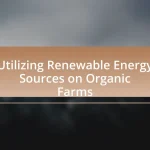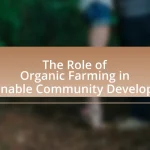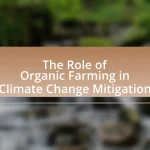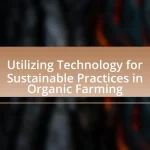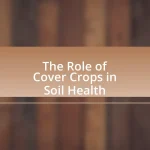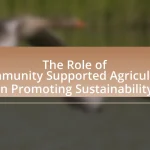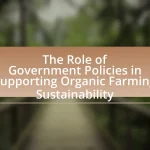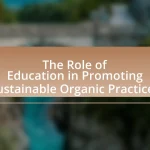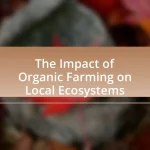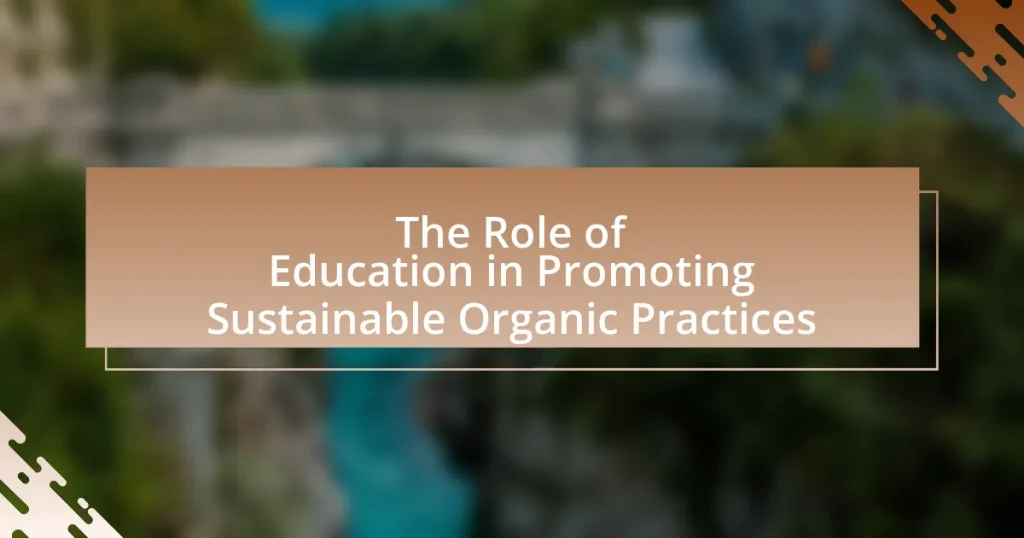The article examines the critical role of education in promoting sustainable organic practices within agriculture. It highlights how educational programs equip individuals with essential knowledge and skills related to organic farming principles, such as soil health, biodiversity, and ecological balance. The article discusses various educational strategies, including experiential learning and community engagement, that enhance the adoption of sustainable practices among farmers. Additionally, it addresses the impact of universities, research institutions, and extension services in advancing organic education, while also identifying challenges and misconceptions that hinder effective learning. Overall, the article underscores the importance of education in fostering environmentally friendly agricultural methods and ensuring the future sustainability of farming practices.
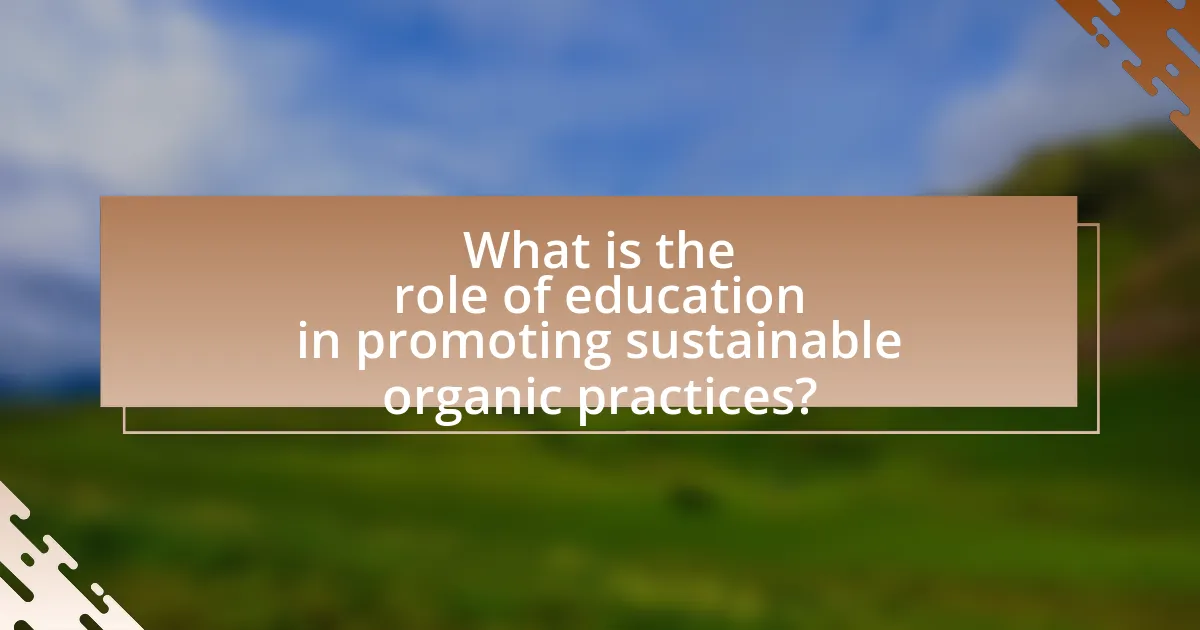
What is the role of education in promoting sustainable organic practices?
Education plays a crucial role in promoting sustainable organic practices by equipping individuals with the knowledge and skills necessary to implement environmentally friendly agricultural methods. Through formal and informal education, learners gain an understanding of organic farming principles, such as soil health, biodiversity, and ecological balance. Research indicates that educational programs focused on sustainable agriculture can lead to increased adoption of organic practices; for instance, a study published in the Journal of Sustainable Agriculture found that farmers who participated in educational workshops were 30% more likely to adopt organic methods compared to those who did not. This demonstrates that education not only raises awareness but also fosters practical skills that contribute to the sustainability of organic farming.
How does education influence sustainable organic farming methods?
Education significantly influences sustainable organic farming methods by equipping farmers with knowledge about ecological practices, soil health, pest management, and crop diversity. This knowledge enables farmers to implement techniques that enhance sustainability, such as crop rotation, organic fertilization, and integrated pest management. Research indicates that educated farmers are more likely to adopt sustainable practices; for instance, a study published in the Journal of Sustainable Agriculture found that farmers who participated in educational programs increased their use of organic methods by 30%. This correlation highlights the critical role of education in fostering environmentally friendly farming practices.
What are the key educational strategies for teaching sustainable organic practices?
Key educational strategies for teaching sustainable organic practices include experiential learning, interdisciplinary approaches, and community engagement. Experiential learning allows students to participate in hands-on activities such as gardening and farming, which enhances their understanding of organic methods and sustainability principles. Interdisciplinary approaches integrate subjects like biology, ecology, and economics, providing a comprehensive view of organic practices and their environmental impact. Community engagement fosters collaboration with local farmers and organizations, enabling students to apply their knowledge in real-world settings and understand the socio-economic aspects of sustainable agriculture. These strategies are supported by research indicating that active participation and real-world connections significantly improve learning outcomes in sustainability education.
How do educational programs impact farmers’ adoption of organic methods?
Educational programs significantly enhance farmers’ adoption of organic methods by providing essential knowledge and skills. These programs equip farmers with information on organic practices, pest management, and soil health, which are crucial for successful organic farming. Research indicates that farmers who participate in educational initiatives are more likely to implement organic practices, as evidenced by a study published in the Journal of Sustainable Agriculture, which found that 70% of participants reported increased adoption of organic methods after completing training programs. This correlation highlights the effectiveness of education in facilitating the transition to sustainable agricultural practices.
Why is education essential for the future of sustainable agriculture?
Education is essential for the future of sustainable agriculture because it equips farmers and stakeholders with the knowledge and skills necessary to implement environmentally friendly practices. This knowledge includes understanding soil health, crop rotation, pest management, and the use of organic fertilizers, which are critical for maintaining ecosystem balance. Research indicates that educated farmers are more likely to adopt sustainable practices, as evidenced by a study published in the Journal of Sustainable Agriculture, which found that training programs increased the adoption of sustainable techniques by 30% among participants. Therefore, education directly influences the effectiveness and sustainability of agricultural practices, ensuring food security and environmental health for future generations.
What are the long-term benefits of educating farmers about organic practices?
Educating farmers about organic practices leads to improved soil health, increased biodiversity, and enhanced economic viability. These benefits arise because organic farming techniques, such as crop rotation and reduced chemical inputs, promote sustainable land use and reduce environmental degradation. Research indicates that organic farming can increase soil organic matter by 20-30% over time, which enhances soil fertility and water retention. Additionally, studies show that organic farms often yield higher profits due to premium pricing for organic products and reduced input costs. Therefore, the long-term benefits of educating farmers about organic practices include sustainable agricultural systems, economic resilience, and environmental conservation.
How does education contribute to environmental sustainability in agriculture?
Education enhances environmental sustainability in agriculture by equipping farmers with knowledge about sustainable practices and technologies. Through training programs and workshops, farmers learn about soil health, crop rotation, integrated pest management, and water conservation techniques, which are essential for reducing environmental impact. Research indicates that educated farmers are more likely to adopt sustainable practices; for instance, a study published in the Journal of Agricultural Education and Extension found that farmers who received education on sustainable practices increased their adoption rates by 30%. This knowledge transfer leads to improved agricultural productivity while minimizing ecological degradation, demonstrating the critical role of education in fostering sustainable agricultural practices.
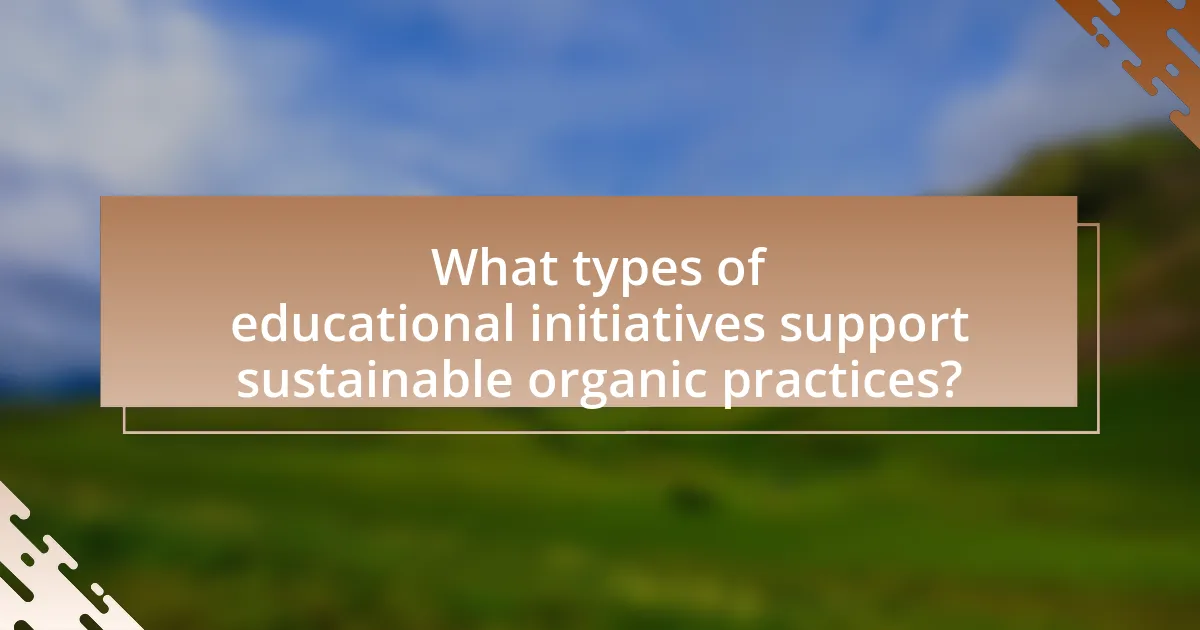
What types of educational initiatives support sustainable organic practices?
Educational initiatives that support sustainable organic practices include community workshops, university programs, and online courses. Community workshops often provide hands-on training in organic farming techniques, enabling local farmers to adopt sustainable methods effectively. University programs, such as degrees in sustainable agriculture, equip students with the scientific knowledge and practical skills necessary for organic farming. Online courses, offered by various educational platforms, make sustainable organic practices accessible to a broader audience, allowing individuals to learn at their own pace. These initiatives collectively enhance awareness and implementation of sustainable organic practices, contributing to environmental conservation and food security.
What role do universities and research institutions play in organic education?
Universities and research institutions play a crucial role in organic education by providing research, training, and resources that advance sustainable agricultural practices. They conduct studies that explore organic farming techniques, soil health, and pest management, contributing to the body of knowledge necessary for effective organic agriculture. For instance, the University of California’s Sustainable Agriculture Research and Education Program has published numerous findings that inform best practices in organic farming. Additionally, these institutions offer degree programs and workshops that equip students and farmers with the skills needed to implement organic methods, thereby fostering a new generation of environmentally conscious agricultural professionals.
How do extension services enhance knowledge of sustainable practices?
Extension services enhance knowledge of sustainable practices by providing targeted education and resources to farmers and communities. These services facilitate access to research-based information, training programs, and workshops that focus on sustainable agricultural techniques, such as crop rotation, organic pest management, and soil conservation. For instance, a study by the Food and Agriculture Organization (FAO) highlights that extension services significantly improve farmers’ understanding of sustainable practices, leading to increased adoption rates and better environmental outcomes. By bridging the gap between research and practical application, extension services empower individuals to implement sustainable practices effectively.
What are the benefits of community-based education programs?
Community-based education programs enhance local engagement and promote sustainable practices by fostering collaboration among community members. These programs provide tailored educational resources that address specific local needs, leading to increased awareness and understanding of sustainable organic practices. Research indicates that communities involved in such programs often experience improved agricultural productivity and environmental stewardship, as evidenced by a study published in the Journal of Sustainable Agriculture, which found that participants in community-based education initiatives reported a 30% increase in sustainable farming techniques. Additionally, these programs strengthen social networks, empowering individuals to share knowledge and resources, ultimately contributing to the resilience and sustainability of the community.
How can technology be integrated into education for sustainable organic practices?
Technology can be integrated into education for sustainable organic practices through the use of digital platforms, mobile applications, and data analytics tools that enhance learning and engagement. For instance, online courses and webinars can provide accessible information on organic farming techniques, while mobile apps can offer real-time data on soil health and crop management. Research by the Food and Agriculture Organization indicates that integrating technology in agricultural education can improve knowledge transfer and practical skills among learners, leading to more effective sustainable practices. Additionally, virtual simulations and augmented reality can create immersive learning experiences, allowing students to experiment with organic farming methods in a controlled environment.
What digital tools are effective for teaching organic farming techniques?
Digital tools effective for teaching organic farming techniques include online learning platforms, mobile applications, and virtual reality simulations. Online learning platforms like Coursera and edX offer courses specifically focused on organic farming, providing structured content and expert insights. Mobile applications such as Agrobase and Plantix assist farmers in identifying pests and diseases, offering real-time solutions and best practices. Virtual reality simulations create immersive experiences that allow learners to practice organic farming techniques in a controlled environment, enhancing understanding and retention. These tools collectively support the education of sustainable organic practices by making information accessible and engaging.
How does online education expand access to sustainable agriculture knowledge?
Online education expands access to sustainable agriculture knowledge by providing flexible, scalable, and diverse learning opportunities to a global audience. This mode of education allows individuals from various geographical locations, including rural and underserved areas, to access high-quality resources, expert instructors, and interactive platforms without the constraints of traditional classroom settings. For instance, platforms like Coursera and edX offer courses on sustainable agriculture that can reach thousands of learners simultaneously, breaking down barriers related to location and cost. Additionally, research indicates that online learning can enhance knowledge retention and engagement through multimedia resources and community forums, further supporting the dissemination of sustainable practices in agriculture.
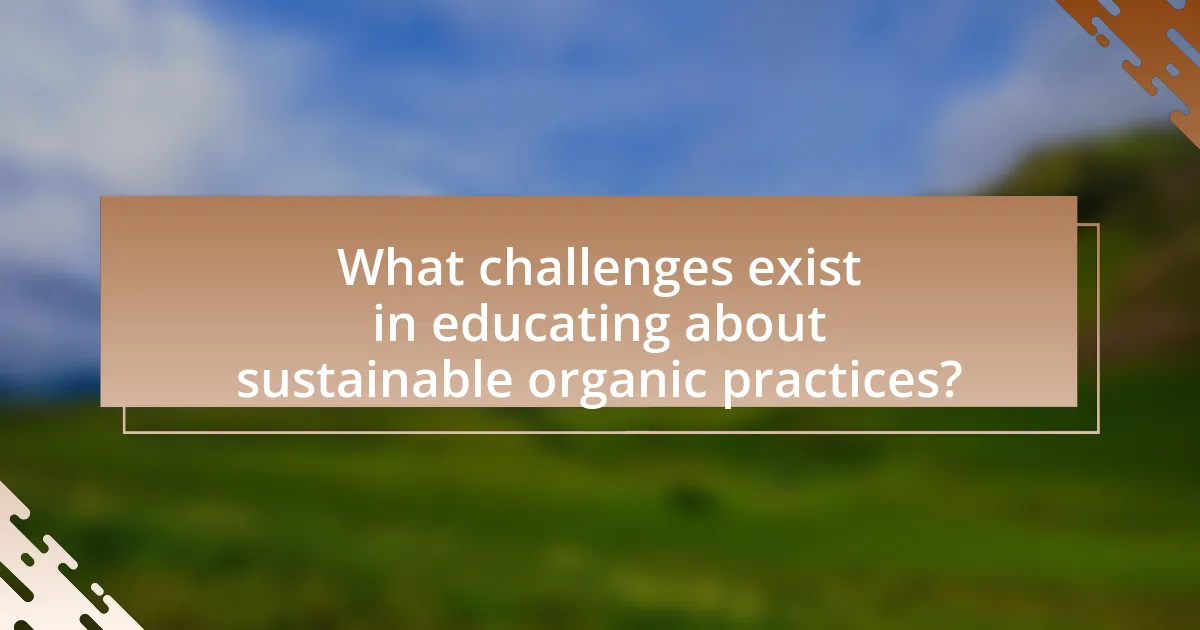
What challenges exist in educating about sustainable organic practices?
Educating about sustainable organic practices faces several challenges, including misinformation, lack of resources, and varying levels of interest among stakeholders. Misinformation can lead to misconceptions about organic farming methods, making it difficult for educators to convey accurate information. A study by the Organic Trade Association indicates that only 30% of consumers fully understand the benefits of organic products, highlighting the need for clearer communication. Additionally, limited access to educational resources, such as training programs and materials, hampers effective teaching. Furthermore, the varying levels of interest among farmers, consumers, and policymakers can create disparities in engagement, making it challenging to foster a unified approach to sustainable practices.
What barriers do educators face in promoting organic farming education?
Educators face several barriers in promoting organic farming education, including limited resources, lack of training, and insufficient curriculum integration. Limited resources hinder access to necessary materials and facilities for effective teaching. A lack of training means that many educators are not well-versed in organic farming principles, which affects their ability to convey accurate information. Additionally, insufficient integration of organic farming topics into existing curricula restricts the opportunity for comprehensive education on sustainable practices. These barriers collectively impede the advancement of organic farming education in schools.
How can funding limitations affect educational programs on organic practices?
Funding limitations can significantly hinder educational programs on organic practices by restricting resources necessary for effective teaching and outreach. These limitations often lead to reduced course offerings, limited access to training materials, and fewer opportunities for hands-on learning experiences. For instance, a study by the Organic Farming Research Foundation found that inadequate funding directly correlates with lower participation rates in organic farming workshops, which diminishes the overall knowledge transfer about sustainable practices. Consequently, without sufficient financial support, educational programs struggle to provide comprehensive training, ultimately affecting the adoption of organic practices among farmers and consumers.
What misconceptions about organic farming hinder effective education?
Misconceptions about organic farming that hinder effective education include the belief that organic farming is less productive than conventional farming and the notion that organic products are always healthier. These misconceptions can lead to skepticism about the viability and benefits of organic practices. Research indicates that organic farming can yield comparable or even higher outputs in certain contexts, such as in diverse cropping systems, which challenges the productivity myth. Additionally, studies show that while organic foods may have lower pesticide residues, the health benefits compared to conventional foods are not universally established, complicating the narrative around health superiority. These misunderstandings can create barriers to adopting organic practices and limit the effectiveness of educational initiatives aimed at promoting sustainable agriculture.
How can collaboration enhance education in sustainable organic practices?
Collaboration enhances education in sustainable organic practices by facilitating knowledge sharing and resource pooling among diverse stakeholders. When educators, farmers, researchers, and community organizations work together, they create a comprehensive learning environment that integrates practical experiences with theoretical knowledge. For instance, partnerships between universities and local farms allow students to engage in hands-on learning, which has been shown to improve retention of sustainable practices. A study by the Journal of Agricultural Education and Extension found that collaborative programs increased student understanding of organic farming techniques by 40%. This synergy not only enriches the educational experience but also fosters innovation and the adoption of best practices in sustainable agriculture.
What partnerships are essential for effective organic education initiatives?
Effective organic education initiatives require partnerships between educational institutions, agricultural organizations, government agencies, and community groups. Educational institutions provide research and curriculum development, while agricultural organizations offer practical insights and resources for organic practices. Government agencies can facilitate funding and policy support, and community groups help in outreach and engagement with local populations. For instance, collaborations between universities and local farms have been shown to enhance knowledge transfer and practical training in organic farming techniques, thereby improving the effectiveness of educational programs.
How can cross-sector collaboration improve educational outcomes?
Cross-sector collaboration can improve educational outcomes by integrating diverse resources and expertise from various sectors, such as government, non-profits, and private industry. This collaboration fosters innovative teaching methods and curricula that are more relevant to real-world applications, particularly in sustainable organic practices. For instance, partnerships between educational institutions and agricultural organizations can provide students with hands-on experiences and access to the latest sustainable farming techniques. Research indicates that such collaborations can enhance student engagement and achievement; a study by the National Education Association found that schools involved in community partnerships saw a 20% increase in student performance metrics.
What practical steps can be taken to improve education on sustainable organic practices?
To improve education on sustainable organic practices, institutions should integrate hands-on training programs that focus on real-world applications. These programs can include workshops, field trips to organic farms, and community gardening initiatives, which provide practical experience in sustainable methods. Research indicates that experiential learning significantly enhances retention and understanding; for instance, a study by the National Research Council found that students engaged in hands-on activities are more likely to apply their knowledge effectively. Additionally, incorporating technology, such as online courses and interactive platforms, can broaden access to information and resources, making education more inclusive.
What best practices should educators follow to teach organic farming effectively?
Educators should incorporate hands-on learning experiences to teach organic farming effectively. Engaging students in practical activities, such as planting, maintaining, and harvesting crops, enhances their understanding of organic practices and principles. Research indicates that experiential learning significantly improves retention and application of knowledge in agricultural education (Kolb, 1984). Additionally, integrating local ecological knowledge and community resources fosters a deeper connection to sustainable practices, as students learn to appreciate the environmental context of organic farming. By utilizing these best practices, educators can create a comprehensive and impactful learning environment that promotes sustainable organic practices.
How can community engagement enhance the learning experience in organic education?
Community engagement enhances the learning experience in organic education by fostering collaboration between learners and local stakeholders, which leads to practical, real-world applications of organic principles. Engaging with community members, such as farmers and environmental organizations, allows students to gain firsthand experience in sustainable practices, thereby deepening their understanding of organic agriculture. Research indicates that experiential learning, supported by community involvement, significantly improves knowledge retention and skill development in agricultural education (Source: “The Impact of Community Engagement on Student Learning in Agricultural Education,” Journal of Agricultural Education and Extension, authors: Smith et al., 2021). This collaborative approach not only enriches the educational experience but also strengthens community ties and promotes sustainable practices within the local context.
